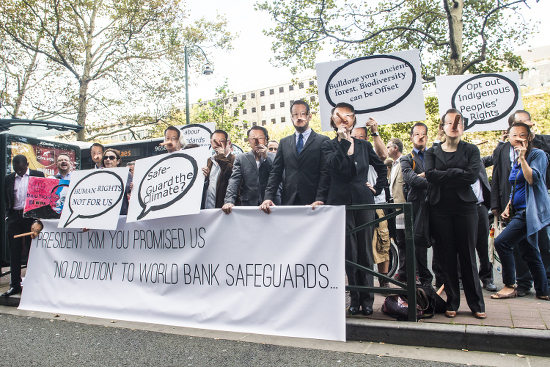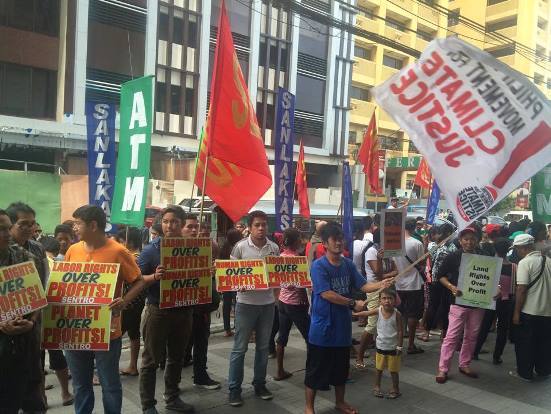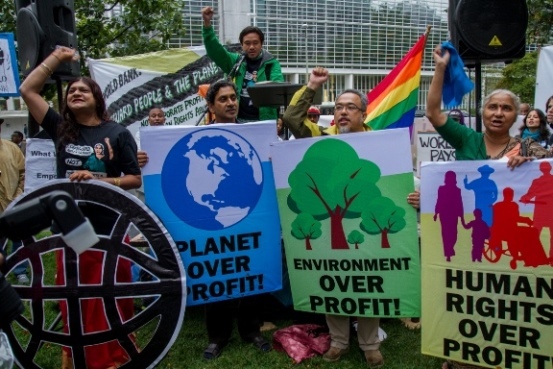Two years ago, the World Bank decided to undergo a review of its environmental and social policies. At the time when this process was launched, the Bank stated that the multi-stage review was being undertaken in response to the need "to better address environmental and social issues that countries face today, to deliver better environmental and social outcomes in the projects and programs the Bank supports."
On July 30th of this year, the Bank released the first draft of new proposed policies for consultation purposes, seeking feedback on its content. This is the second round of consultations for this review process. The first round of global consultations resulted in a large input from civil society groups and affected communities. The second round of consultations was launched hastily and before any feedback could be sent from the directors of the Bank itself. This as the draft was leaked by the Bank management before receiving any internal feedback. The leaking issue is being currently investigated within the Bank.

Photo caption: Protesters in front of the World Bank building in Brussels, Belgium (Photo credits: Arnaud Ghys)
The second round of consultations isn't going well for the Bank. Civil society organizations staged a protest in Brussels opposing the first draft of safeguards, while groups that were invited to consultations in Washington DC and Manila walked out in the middle of the process and staged protests outside the consultation venues. CSOs are unhappy with the way consultations are unfolding.
A group of civil society organizations sent a letter to the President of the Bank identifying the deficiencies during the first two months of consultations. According to the letter, communities, civil society organizations and indigenous peoples have experienced many obstructions to "their rights to participation in the revision of the safeguards framework."
The letter points out that the information available on the consultation process is inadequate and that "it is unclear what the full consultation plan is, how long the consultation will last, and where in-country consultations will take place." CSOs say that the Bank's practice of two weeks' notice on consultation date and venue is "grossly inadequate time to get the word out about a planned consultation and for those who may be interested in attending to request an invitation, to receive a response, arrange resources and transportation to the capital site, address any accessibility needs, and absorb the complex documents and issues at play necessary to allow meaningful participation." These consultation announcements for many countries were shorter than two weeks. This practice breaches the Bank's own consultation guideline, which requires a 4 week prior notice for regular consultations, and even longer notice times for "complex consultations," such as the Safeguards consultation.

Photo caption: Protesters in front of the World Bank consultation venue in Manila, the Philippines (Photo credits: Alyansa Tigil Mina)
It also remains unknown how groups are being selected and invited to participate in the process, the letter continues. For several consultations, including in the Philippines, Dakar, and Canada, outreach efforts excluded human rights groups that have had longstanding engagement with the Bank on these issues. On other occasions, civil society organizations who contacted Bank staff in order to register have been told that space is limited or received a response too delayed to allow participation.
The process was prohibitive to Indigenous Peoples as well. When indigenous peoples' organizations in Uganda and Kenya applied to join the consultation in Tanzania, which was meant to cover all three countries, they were told that the Bank had selected five civil society participants from each country and there were no funds, nor room, for any more. While IPs from central, western and southern Africa who wanted to attend the only meeting for them in Johannesburg held on November 21st could not attend because of difficulties to get visas to travel there. IPs are especially concerned with the Bank's intention to introduce an "opt-out" clause in the new policies, that will strip IPs from their rights in World Bank's projects.

Photo caption: Protesters in front of the World Bank headquarters in Washington DC, USA (Photo credits: Joe Athialy)
The first draft of the Safeguards framework was harshly criticized by the CSOs and affected communities for containing vague language and referencing important details that remain to be provided in other documents, including annexes and directives. Groups request that these documents be made available now and be part of the ongoing consultation process itself. Civil society groups urge the Bank to address the serious shortcomings of the Safeguards consultations and make good on their commitments to transparency and citizen engagement.
In response to civil society outrage in October, World Bank President Kim announced that the consultation process for the new policies will be extended beyond the initial plan, which foresaw conclusion of this process by the end of December. The problems identified in the consultation process since then will deal another blow to an already highly contentious process. CSOs are already asking the Bank to completely redo the consultations to properly address the issues they have identified.
